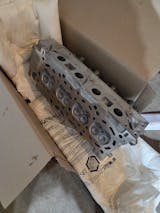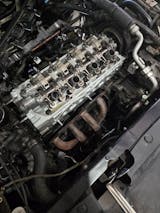When you think about your car's engine, you might picture the powerful roar of the pistons, the rhythmic ticking of the valves, or even the gentle hum of the alternator. But what about the unsung hero lurking beneath the surface? It's about the automotive water pump, one of the most essential components in your engine. In this article, we'll dive deep into the world of automotive water pumps, exploring their different types, the ongoing debate between electric and mechanical options, and why choosing the right one is crucial for your beloved vehicle.
In This Article
The Basics: What is an Automotive Water Pump?
Before we dive into the nitty-gritty details, let's start with the basics. The automotive water pump stands as an indispensable component within your car's cooling system, tasked with the primary responsibility of facilitating the circulation of coolant—typically a blend of water and antifreeze—throughout the engine to maintain its optimal temperature. In essence, it prevents your engine from overheating, ensuring that it runs efficiently and avoiding catastrophic damage.
Types of Automotive Water Pumps
Now that we have a fundamental understanding of what an automotive water pump does, let's explore the different types of car water pumps available.
1. Mechanical Water Pumps
Mechanical water pumps have been a steadfast presence in the automotive realm. Usually, a belt connecting them to the engine's crankshaft powers them. As the engine turns, the belt rotates the water pump's impeller, creating the necessary flow of coolant.
Mechanical water pumps are known for their reliability and longevity. They have a straightforward design, making them easy to maintain and repair if needed. However, they are not without their drawbacks. Because they rely on a belt-driven system, their performance is directly linked to the engine's RPM (revolutions per minute). This means that at low engine speeds, such as during idle or in stop-and-go traffic, mechanical water pumps may not circulate coolant as efficiently, potentially leading to overheating issues.
2. Electric Water Pumps
In recent years, electric water pumps have gained popularity in the automotive industry. Water pumps that run on electricity have greater control over the circulation of coolant than their mechanical counterparts. These pumps can operate independently of engine speed, ensuring that your engine stays cool even in low-speed situations.
Electric water pumps offer several advantages. Using them reduces engine load and improves fuel efficiency, as they only run when necessary. Additionally, their precise control over coolant flow can lead to better temperature regulation and improved overall engine performance. However, electric water pumps are generally more complex than mechanical ones, and repairs can be more expensive.
3. Hybrid Water Pumps
As technology continues to advance, hybrid water pumps have emerged as a compromise between mechanical and electric options. These pumps combine the simplicity and reliability of mechanical pumps with the improved control and efficiency of electric pumps.
Hybrid water pumps typically feature an electric motor that assists the mechanical drive when needed. For example, during low-speed operation or when the engine is idling, the electric motor can kick in to ensure adequate coolant circulation. This hybrid approach aims to provide the best of both worlds, offering reliable performance under various driving conditions.
4. Auxiliary Water Pumps
In some vehicles, especially those equipped with complex heating and cooling systems, auxiliary water pumps come into play. These pumps are responsible for maintaining a consistent cabin temperature and can circulate coolant to various components, such as the heater core and turbochargers.
Auxiliary water pumps are often used in high-end luxury cars, where comfort and performance are paramount. They ensure that passengers enjoy a comfortable climate inside the vehicle and that performance-enhancing systems operate optimally.
Electric or mechanical water pump? Which is the best?
You might be wondering which automotive water pump is the right one for your car after learning about different types. To answer that question, let's delve into the ongoing debate between mechanical and electric water pumps.
Mechanical vs. Electric: The Pros and Cons
Mechanical Water Pumps:
Pros:
- Reliability: Water pumps made of mechanical materials are well known for their reliability.
- Simplicity: Their operation and maintenance are simple.
- Cost-effective: Repairs and replacements tend to be more affordable.
Cons:
- Engine-speed dependent: Performance can suffer at low engine speeds.
- Energy inefficiency: They consume more power than electric pumps.
Electric Water Pumps:
Pros:
- Precise control: They can circulate coolant at variable speeds, independent of engine RPM.
- Energy-efficient: They operate only when necessary, reducing the load on the engine.
- Improved performance: Better temperature regulation can enhance engine performance.
Cons:
- Complexity: Electric water pumps are more intricate and more expensive to repair.
- Reliability concerns: Some drivers worry about electrical failures.
Making the Right Choice
The decision between a mechanical and electric water pump ultimately depends on your driving habits, the specific needs of your vehicle, and your budget. If you're driving an older car with a simple engine design and primarily use it for short commutes, a mechanical water pump may suffice. It offers reliability without the added complexity of an electric system.
On the other hand, an electric water pump could be the better choice if you have a modern vehicle with advanced engine management systems and frequently find yourself in heavy traffic or stop-and-go situations. It offers precise temperature control, which can lead to improved fuel efficiency and engine performance.
The Importance of Regular Maintenance
Regular maintenance of your engine's water pump is crucial, no matter what type you choose. A neglected water pump can cause expensive repairs and potential damage to your engine. The following tips will help you maintain your vehicle:
1. Check for Leaks
Maintain a regular check on your water pump to ensure there is no leakage of coolant. A leaky water pump can result in overheating and damage to the engine. A leak should be addressed as soon as possible.
2. Replace Timing Belts
If your car has a mechanical water pump that is powered by a timing belt, be sure to replace the belt at the recommended intervals specified by the manufacturer. A broken timing belt may be the cause of an engine failure.
3. Monitor Coolant Levels
Regularly check your car's coolant levels. A consistent decrease in coolant may signal an issue with either your water pump or the entire cooling system.
4. Listen for Unusual Noises
Stay alert to any unusual sounds originating from your engine compartment. If you hear squeaks or grinding noises, they might be indicative of problems with the water pump's bearings or impeller.
5. Follow The Maintenance Schedule
Adhere to your vehicle's recommended maintenance schedule, which typically includes checking and servicing the water pump at specific mileage intervals.
Conclusion: The Beating Heart of Your Engine
In the grand symphony of your car's engine, the automotive water pump may not take center stage, but it plays a crucial role in keeping everything running smoothly. Whether you opt for a reliable mechanical pump, a high-tech electric one, or a hybrid model, the key is to ensure that it's well-maintained and suited to your driving needs.
The next time you insert the key and your engine roars to life, pause for a moment to acknowledge the unsung hero residing beneath the hood—the water pump automotive. It's the beating heart of your engine, tirelessly circulating coolant to keep things cool, ensuring you can hit the road with confidence.
Remember, a well-maintained water pump is the guardian of your engine's health, and by choosing wisely, you can enjoy many more miles of trouble-free driving. Whether you're embarking on a cross-country road trip or simply navigating your daily commute, your automotive water pump will be there, silently doing its job to keep your engine's temperature in check.
So, the next time you pass by an automotive repair shop or pop the hood of your car, you'll have a newfound appreciation for the unassuming yet essential automobile water pump. It's a small but mighty component that ensures your engine's heart keeps beating strong, mile after mile. When it's time for maintenance or replacement, remember to check out Allied Motor Parts for quality automotive parts and expertise to keep your vehicle in top shape.








